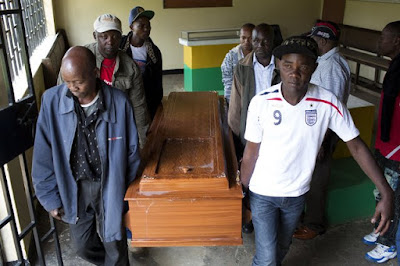 It’s crazy how Kenyans give more funds for burial than they do for treatment of an ailing patient. “It is a very weird behaviour; it is indicative of misplaced priorities,” says Sociology professor Paul Ochola of Integrity county Foundation in Kisumu.
It’s crazy how Kenyans give more funds for burial than they do for treatment of an ailing patient. “It is a very weird behaviour; it is indicative of misplaced priorities,” says Sociology professor Paul Ochola of Integrity county Foundation in Kisumu.
In 2016 July, renowned musician, the late Achieng Abura lamented the cold shoulder she was receiving from ‘kith and kin’ after asking for financial help to take her son to hospital.
Less than ten people showed up for the meeting meant to fundraise Sh12 million that the son — a heart and sickle cell patient — needed for treatment. “There were less than ten people,” she told a local newspaper. “I’ve raised money for so many things and I was hoping that somebody in turn says, ‘Okay, let’s support her.’”
Achieng died three months later while at Kenyatta National Hospital’s private wing — where it was rumoured she was suffering from depression and other weight related complications. “That is not how our forefathers behaved,” Prof. Ochola says. “This kind of behaviour formed in recent years with the advent of capitalism.”
When messages of condolences and support began pouring in for Achieng lawyer Donald B. Kipkorir took to his Facebook wall to call out ‘hypocritical’ Kenyans.
Kipkorir, from his choice of words, was not amused by those who were ‘commiserating’ with the family. He wrote: “In death, her body will receive more money and friends than she received when alive. Why do Kenyans turn up in multitude calling themselves friends of one who is dead, when they aren’t there when they were alive?”
The African society, argues Prof. Oluoch, has its culture steeped in spirituality. As such, death marks a transition between the physical world and the spirit world.
“There are people who feel guilty for neglecting the deceased. Showing concern, even contributing the money they couldn’t contribute when this person was still alive, is guilt cleansing ritual for them,” he says.
The professor argues that while people still have a firm grip on spirituality many have let go of our forefathers’ communal way of life, “where a sick person was well looked after and cared for.”
Stories like Achieng’s abound. At the burial of his father, Joseph Okutayi derided the manner in which mourners thronged his family’s homestead when they remained largely out of as the family struggled to fly the old man abroad for specialised treatment.
Mzee Okutayi, a former civil servant, succumbed to colon cancer, a disease he battled for three years. In those three years the old man’s family organised four fundraising events.
“He needed surgery and some rounds of chemotherapy,” Joseph, a friend from my university days says. “We needed at least Sh2 million to get it done.” All uncles, aunties, nephews, cousins, brothers, nieces, neighbours and friends received invitations.
Despite their efforts attendance was far from impressive, Joseph says. In the first meeting a total of Sh87, 000 was raised, an amount that paled against the Sh2 million the family was gunning for.
“I almost laughed my head off: it was like a joke,” Joseph says. “How could a fundraising aiming at Sh2 million end with less than Sh100, 000?”
In the months leading to his death, the old man needed to fly to India for address complications that arose from years of chemotherapy. Unfortunately, no help was forthcoming.
“But when it was time to bury him, they thronged our home, acting all nice and weeping sheepishly when they couldn’t avail the money he needed for treatment,” Joseph says, downcast. Kipkorir’s post attracted comments from many Kenyans. One of them, Mathew Mwakio, called this double standard ‘the way of man’.
Crazy Monday reached Mathew (an insurance agent) who aptly proposed that individuals get insurance cover for last expense — an insurance utility whose benefits liquidate when the insurance holder dies.
“In Africa we attend funerals because we don’t want to attract questions from kin who may feel that absence at the funeral amounts to insensitivity.
The truth is families are getting less cohesive and people are finding themselves alone in their struggles,” Mathew explained. And when we attend funerals, he says, we do so to look good; to save face.
But in Janet Musembi’s opinion, ours is a wretched society, “that would rather celebrate you in death than when alive”. Janet, a Nairobian, believes that capitalism has shattered the bonds that pulled society together. “When you die that’s when you get sympathy – people will shade crocodile tears,” she says.
In 2014, after 4 years of courtship, she was marrying her fiancé. “We set up a committee that would oversee preparations to the D-day,” she recalls. The couple’s love had been born from introductions by friends. “We wanted to have a beautiful celebration for us, family and friends,” she says.
But the couple could not raise the wedding budget. They approached family and friends to fill the gaping hole in the budget. She says: “Some friends were willing to contribute for the wedding. Some, however, were downright uncouth.” Her boss blatantly told her that she would rather contribute for a funeral – where there is actual need, the boss said.
“I was shocked about her views. I couldn’t understand why she would rather contribute to my funeral than my wedding,” she poses. According to Prof. Ochola, our way of life should be pro-living than celebrating deaths.
“Once a person is dead you can’t claim to do something to help that person,” he says.
www.sde.co.ke
No comments:
Post a Comment
COMMENTS EXPRESS BY READERS ON THIS PAGE ARE PERSONAL OPPPION OF THE READER(S) AND DO NOT REPRESENT THE VIEWS OF THE ADMIN.